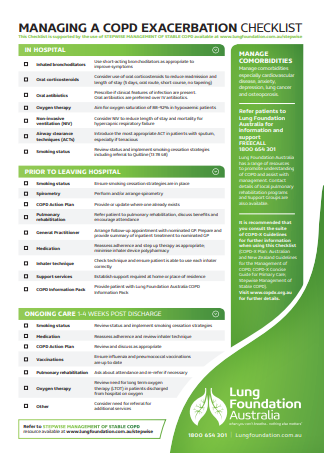X3.7 Discharge planning
Discharge planning involves the patient, external lay and professional carers, the multidisciplinary hospital and community team and the patient’s regular GP. It should commence on admission and be documented within 24–48 hours (see Box 16).
Lung Foundation Australia has developed the Managing COPD Exacerbation Checklist available at: https://lungfoundation.com.au/resources/managing-copd-exacerbation-checklist/ which provides guidance on managing a patient at three stages – in hospital; prior to leaving hospital; and on an ongoing basis 1-4 weeks post-discharge.
Appropriate patient education and attention to preventive management are likely to reduce the frequency of further exacerbations. Assessment of social supports and domestic arrangements are critical in discharge planning. Medicare items support aspects of discharge planning. See http://www.health.gov.au/internet/main/publishing.nsf/Content/mbsprimarycare-factsheet-chronicdisease.htm
A discharge pack, which includes general information about COPD, advice on medication use and written instructions on use of inhalation and oxygen devices, if appropriate, as well as a plan for management of worsening symptoms, should be provided. The GP (and respiratory outreach program, if available) should be notified during the patient’s admission. A case conference involving the multidisciplinary team and GP may assist successful transition to the community. Medicare Benefits Schedule Enhanced Primary Care item numbers may be claimed for “participation in a case conference” and “contribution to a care plan” (see section D).
Before discharge, referral to a comprehensive pulmonary rehabilitation program should be considered (see Figure 9).
A meta-analysis which included an appraisal of four RCTs across three countries and which demonstrated that the use of COPD discharge bundles reduced hospital readmissions by 20% showed no demonstrable benefit in terms of LOS or mortality (Ospina 2017). Outpatient follow-up was found to be a core element to reduce re-admissions.
A systematic literature review of 13 evidence based clinical pathways used in either primary care or hospital settings across 10 countries has demonstrated a reduction in COPD re-admissions by 34% (OR 0.66, 95% CI 0.49 to 0.88) [evidence level I], although with little reduction in length of stay. Studies with longer follow ups appeared more likely to detect benefits (Plishka 2019).
Figure 9. Managing a COPD Exacerbation Checklist Source: https://lungfoundation.com.au/resources/managing-copd-exacerbation-checklist/ |


